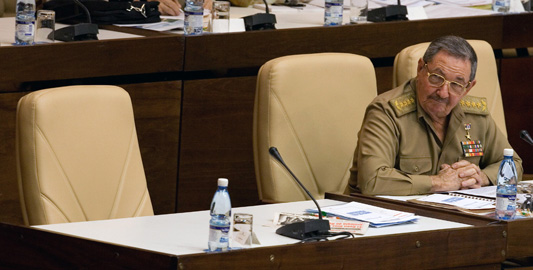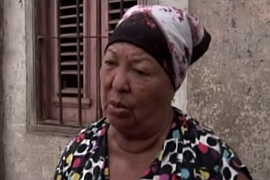A year without Fidel
Al Jazeera finds many Cubans want a better life.

 |
| Raul is still overshadowed by Fidel, even when he is not there [AFP] |
It has been a year since Fidel Castro, the Cuban president, was last seen in public. As the nation prepares to celebrate one of the milestones of the revolution, Mariana Sanchez finds many Cubans are eager for a better life post-Fidel.
Nearly 50 years after the revolution that brought Fidel Castro to power, Cuba remains a country devoted to the past.
Throughout the country, Cubans are preparing to celebrate its most important anniversary – the attack by Castro in 1953 with a small group of supporters on the Moncada military barracks outside the city of Santiago de Cuba.
As a military endeavour, the attack was nothing short of disastrous with more than 60 of the 135 guerrillas involved killed.
| In video | ||
|
But it is still regarded as an important anniversary for the country. The attack’s failure lead Castro to form the July 26 movement. Six years later this led to the culmination of the Cuban revolution and the overthrow of Fulgencio Batista, then an authoritarian leader.
Fidel Castro has remained in power since.
Yadis Leiva, a 78-year-old from Havana, remembers the attack as an event that brought hope to Cuba’s poor. They hoped political change was on the horizon.
Uncertainty
“It was what freed us and put us on the path to save the Cuban people,” she says.
It was during the Moncoda commemoration a year ago that the Cuban people last saw their leader speak in public.
Hours after his speech he was taken to hospital to begin surgery for intestinal bleeding. He handed the reins of power over temporarily to his brother and fellow Moncoda veteran Raul.
Cuban newspapers have reported that it is Raul, also the country’s defence chief, who will lead this year’s commemoration in the eastern city of Camaguey. About 100,000 people are expected to attend.
Fidel’s future
Uncertainty still surrounds Castro’s future. The official line is that he is improving and that he will return to day-to-day power at some stage.
He has recently made his presence felt via a series of front-page editorials in the official Granma newspaper, the last of which criticised the US for the apparent “defection” of two champion boxers who disappeared from the Pan American games in Brazil.
Some analysts say that, despite his absence, Castro’s influence still has a profound effect on society.
Daniel Erikson, from the Caribbean Programme of Inter-American Dialogue, says: “It’s been one year, and there is frustration that there has not been more change, more reform, especially in the economic sphere where Cubans are in dire need.”
“It’s thought Fidel’s presence puts constraints on Raul in terms of his ability to implement changes in the country.”
No food on the table
Ariel Duran makes and sells stained-glass windows in Havana. He is one of the few Cubans who is allowed to be self-employed.
In one of a series of measures aimed at alleviating the economic crisis following the collapse of the Soviet Union in the 1990s the Communist party authorised 150 occupations self-employment status.
 |
| For Cubans such as Yadis Leiva, Fidel is the only leader they have ever known |
But despite being relatively privileged among Cubans, Duran believes the revolution has done more harm than good.
“The old people might see it as a great triumph because they had nothing and it gave them something,” he says.
“As I see it everything has been a lie for 50 years because there’s not enough food on the table.”
But for many other Cubans, Fidel Castro is the only leader they know and trust.
Yadis Leiva says: “The majority of youth don’t appreciate what they have.
“They just want more and more, but they can’t have it, it has to be how the leader says.”
Whether Castro returns to power or not, some Cubans say it is time for a change. They want the government to improve basic services such as housing and transportation and allow more of them to open their own business.
Raul Castro has so far avoided the public eye, but analysts believe he could open up the economy. So far no substantial reforms have been initiated.
Raul also called for dialogue with the US, but the government of George Bush has said that this would be possible only if Cuba holds free elections and releases political prisoners.
But, with Fidel Castro still controlling the island, some say change is some way off.
